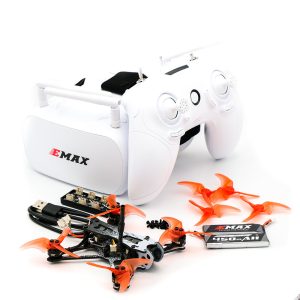
Emax Tinyhawk II Freestyle Drone User Manual
Thanks for purchasing the Tinyhawk II Freestyle. Designed in California, assembled in China.
Disclaimer
Please read the disclaimer carefully before using this product. By using this product, you hereby agree to this disclaimer and signify that you have read them carefully and
completely. This product is not suitable for people under the age of 18. Adult supervision is highly recommended for kids under the age of 18.
Our Tinyhawk II Freestyle features open-source flight controller and Electronic Speed Controllers to meet the FPV enthusiasts’ need to upgrade their quad.
Please read the instruction manual and warnings carefully. Before every flight, make sure the battery is fully charged and power connections are secure. DO NOT fly around crowds, children, animals or objects. EMAX ACCEPTS NO LIABILITY FOR
DAMAGE(S) OR INJURIES INCURRED DIRECTLY OR INDIRECTLY FROM THE USE OF THIS PRODUCT.
Precautions
Please follow the instructions to assemble and to operate this product in a proper way.
Pilots do not use this product if you have physical or mental illness, dizziness, fatigued, or use while under the influence of alcohol or drugs.
Please fly in a safe area away from people Do not modify or use other parts and accessories not approved for the use of EMAX. Do not use this product in harsh environments (such as winds, rain, lightning, snow, etc.). Do not use this product in a strong electromagnetic environment.
Support
Please visit emax-usa.com or emaxmodel.com for any updates or support needs.
Product specification
Tinyhawk II Freestyle |
Parameter |
| Diagonal wheelbase (without paddles) | 115mm |
| Maximum size of the aircraft (without antenna, cable tie) |
143×137×23(mm) |
| Aircraft weight (without battery) | 57g |
| Motor | TH1103-7000KV |
| Propeller | Avan Rush 2.5 inch Propeller |
| Main Flight Controller | F4(MATEKF411RX firmware) 4 in one 5A ESC SPI RX receiver(Compatible with Frsky remote control D8 mode) |
| Camera | RunCam Nano 2 Camera |
| Transmitter | 0-25-100-200mW Adjustable frequency 37CH. Support SmartAudio. Ham radio license required for use in North America. |
| Battery | 1 Cell 450 mAh HV lipo battery ×2 |
| battery | 1 cell 18650 lipo battery |
| Radio | |
| Maximum appearance size | 181×213×80(mm) |
| weight (without battery) | 211g |
| Number of channels | 6 Channels |
| Transmission frequency | 2.4GHz ISM Band(2400MHz~2483.5MHz) |
| Output Power | 22dbm |
| Modulation | GFSK |
Goggle |
|
| Maximum appearance size | 140×153×90(mm) |
| weight (without battery) | 398g |
| Resolution | 480×272 |
| battery | 1 cell 18650 lipo battery |
Product list
- Tinyhawk II Freestyle × 1
- Radio × 1
- Goggle × 1
- Goggle battery box (including 1 cell 18650 battery) × 1
- Emax 1s HV 450 mAh × 2
- Charger × 1
- USB data wire × 1
- User manual website card × 1
- Propeller Set (2x CW, 2x CCW)
- Screw pack x 1
Tinyhawk II Freestyle Structure
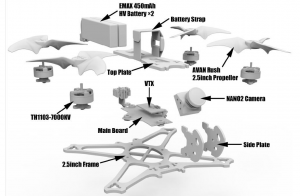
Radio and Goggle Diagram
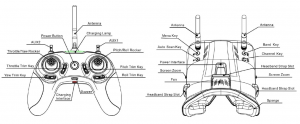
Radio
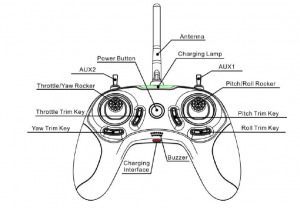
Battery and Charging
This is a 6 channel 2.4 GHz radio, The radio is powered with an 18650 battery. The radio comes with the battery installed; however if a reinstall is needed make sure the negative side is on the side touching the spring of the radio. The radio can be charged with a micro usb cable attached right below the speaker and power button.
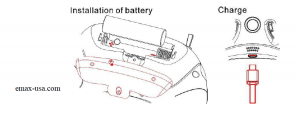
Operation
Power
Power on and off by holding the power button for 2 seconds. The center light will turn green when on.
Binding
The radio comes already bound to tinyhawk II Freestyle in the ready to fly kit. If binding is necessary follow these steps:
- Put tinyhawk II Freestyle into binding mode by pressing and holding the bind button while powering on tinyhawk II Freestyle. A green light will power on tinyhawk II Freestyle flight controller indicating in bind mode.
- Put the radio into bind mode by first powering on the radio and then press and hold both the throttle trim down and pitch trim down buttons for 2 seconds until a red light turns on next to the green light around the power button. Release the buttons and the red and green lights will flash indicating the radio is in binding mode.
- Monitor the tinyhawk II Freestyle flight controller; a red light will flash on the board indicating when binding has been completed.
- Take the radio out of binding mode by pressing and holding the throttle trim down and pitch trim down buttons for 2 seconds until the red lights turn off.
- Unplug tinyhawk II Freestyle battery to power it down to take it out of binding mode.
- Tinyhawk II Freestyle and radio will not be bound.
Trim
There are trim buttons for each axis on each gimbal. Each trim adjustment will beep the radio and a longer beep will sound for center trim. Adjust roll and pitch trim whenn hovering to achieve a stable hover with no gimbal input.
Gimbal Calibration
The radio comes pre-calibrated; however, recalibrating can help troubleshoot some problems.
- With the radio off, pull the right gimbal to the lower right corner and then power on.
- Release the right gimbal to its center position and red lights will flash around the power button indicating in calibration mode.
- Use the right gimbal and pitch forward to the maximum pitch forward point then press the respective trim button (pitch positive trim) setting the maximum point for the pitch axis.
- Repeat for the right gimbal most minimum position and press the respective trim button (pitch negative trim) to set the minum.
- Repeat step 3 and 4 for each axis on both gimbals.
- Press and hold both throttle trim buttons and both pitch trim buttons for 2 seconds to exit calibration mode.
Goggles
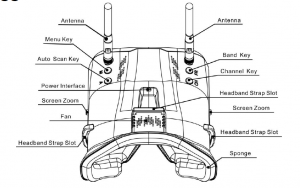
Battery and Charging
The battery cartridge comes preinstalled with a 18650 battery. If a battery reinstall is required please use caution making sure to install with the correct polarity. The battery can be charged in the cartridge with a micro USB cable. When the battery is charging the indicator light is green. The indicator light will turn red when charging is complete.
Tip: When “low power” is displayed on the goggle display, please charge the battery. Otherwise, goggle will shut down in two minutes

Assembly
Minimal assembly is required for proper operation of the goggles. Follow the steps below.
- Attach the two supplied antennas by screwing them on to the SMA connection point.
- Place the battery cartridge in the sleeve on the backside of the head strap.
- Feed the power lead through the loop on the top side of the head strap and plug in the power lead to the port on the goggles. This will power the goggles.
- Please remove antennas and power lead when traveling/storing the goggles.
Operation
Power
Power on the goggles by plugging in the power lead from the battery cartridge.
Power off by unplugging the power lead from the battery cartridge.
Video Channel Selection
There are 2 buttons (CH and FR) that can manually select the correct channel and frequency band. The table below shows the channel and frequency band map with the respective frequency number. This is the recommended way to change channels to the correct frequency on tinyhawk II Freestyle. The CH button will cycle through the channel number (1-8) while the FR button will cycle through the frequency band (A,B,E,F,R,H). The frequency band and channel number will be shown in the upper left corner of the screen when cycling through channels.
Tip: Before adjusting the parameters, the CH button or FR button must be pressed and hold for 3s.
Tip: Make sure tinyhawk II Freestyle is powered on. When cycling through channels it will be easier to spot the correct one with the video feed from tinyhawk II Freestyle.

Caution: Make sure the goggles are on the correct channel that tinyhawk II Freestyle is on. The current selected band and channel of tinyhawk II Freestyle is shown in the
upper left corner of the screen.
Video Channel Auto Scanning
There is a scanning function on the goggles to aid in finding which channel tinyhawk II is on. First power on tinyhawk II then press the “A” button and hold for 3s to start
the auto scan mode. To stop the auto scan mode can be press the CH button or the FR button .This mode will cycle through all channels and select the channel with the best video reception. The frequency band and channel number will be shown in the upper left corner of the screen when cycling through channels.
Caution: If using this feature with multiple tinyhawk II (or other drones with a vtx)powered on, autoscan may select the wrong drones channel. We recommendmanually selecting the correct channel to prevent mismatch errors.
Screen Adjustments
The menu button (“M”) will bring up a menu where you can adjust brightness, contrast, saturation, and language. Press the menu button (“M”) and hold for 3S to access the menu. To cycle through menu options, press the menu button again. With the current selection highlighted, adjustments can be made pressing the “FR” button
to increment and “CH” to decrement. The menu will close automatically after 3 seconds if no input was detected.
Tinyhawk II Freestyle
Propeller Direction and Mounting
There are 2 spinning directions for Tinyhawk II Freestyle propellers, Clockwise (CW and Counter-Clockwise (CCW). When Buying a set of propellers, 2 CW and 2 CCW
will be given. The blunt leading edge indicates the direction the propeller is suppose to rotate as compared to the sharp trailing edge. When mounting propellers please
make sure the correct orientation shown in the diagram below.
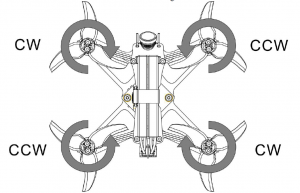
Caution: Failure to mount the propellers in the correct orientation will cause
Tinyhawk II Freestyle to not fly correctly and with no control. Please double check for the correct orientation.
- 1. Push the propeller down the motor
- 2. Tighten M2 screw and secure it.
- 3. Periodically check nut tightness to ensure it will stay tight during flight.
Tinyhawk II Freestyle VTX Settings
Changing VTX setting via Betaflight OSD
Tinyhawk II Freestyle is equipped with SmartAudio and is already configured with stock settings. The SmartAudio line is operated on UART 2 TX.
- Power on Tinyhawk II Freestyle, goggles, and Controller.
- Follow the tips on screen to enter the main settings menu: THROTTLE MID+ YAW LEFT+ PITCH UP to enter OSD parameter adjustment menu. as shown in Figure 1.
- In the menu interface, switching PITCH up/down to choose menu option. Move the cursor to “FEATURES” and stir Roll stick right to enter next menu. as shown in Figure 2. Using PITCH stick to move cursor to “VTX SA”, as shown in Figure 3.Then pull ROLL stick right to enter VTX configuration menu, as shown in Figure 4.
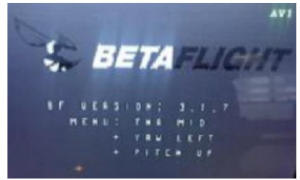
Figure 1
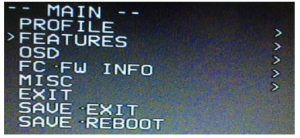
Figure 2

Figure 3
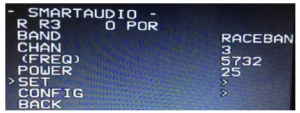
Figure 4
4. In the menu of VTX SA, we can configure the BAND, CHAN and POWER. Pulling the PITCH stick to move cursor up and down to choose VTX options that need
setting. While pulling ROLL stick left and right to change the corresponding parameters.Once the parameters is set, moving the cursor to “SET”, then turn ROLL stick right to enter “SET” and choose “YES” and turn ROLL stick right to save setting parameters, as shown in Figure 5.
5. In the menu of VTX SA, moving cursor to “CONFIG” to enter menu; While moving cursor to “PIT FMODE” and pulling ROLL stick right can turn off the VTX power, as shown in Figure 6.
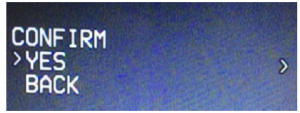
Figure 5

Figure 6
VTX Channel Settings with the Button
NOTE: You must “disable” VTX Smart AUDIO on UART 2 in order for push button VTX adjustment to work as described below.
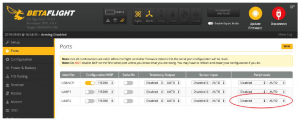
Vtx Schematic and Button Diagram
" sizes="(max-width: 671px) 100vw, 671px" alt="diagram, schematic" width="671" height="461" data-ezsrcset="https://manuals.plus/wp-content/uploads/2021/03/Emax-Tinyhawk-II-Freestyle-User-Manual_17-300x206.png 300w,https://manuals.plus/wp-content/uploads/2021/03/Emax-Tinyhawk-II-Freestyle-User-Manual_17-768x526.png 768w,https://manuals.plus/wp-content/uploads/2021/03/Emax-Tinyhawk-II-Freestyle-User-Manual_17.png 788w" data-ezsrc="https://manuals.plus/wp-content/uploads/2021/03/Emax-Tinyhawk-II-Freestyle-User-Manual_17-300x206.png" />
- Normal display
When powered on, the parameters of frequency group band, frequency point and power are displayed twice by LED cycle, then the LED is extinguished. To check frequency group band ,channel and power status click the button once quickly, and LED starts to indicate frequency band band , frequency channel and power. First indicate the frequency group band and then indicate the frequency channel, final indicative power. After all 2 rounds of LED display cycles, all LED will be off. - Menu Entry / Exit (1)Press the button and hold for 5s to enter the menu. After entering the menu, band LED lights up.
- (2)Press the button and hold for 5s again to save parameters and exit the menu. After saving and exiting the menu, all LED goes out.
3.Enter/Exit Band / Channel / Power option
(1) After entering menu, short click button to switch frequency group band /
frequency point / power, and the LED of the corresponding menu is lit.
(2) Press the button and hold for 2s to enter frequency group band / channel /
power option.
(3) Press the button and hold for 2s again to exit frequency group band / channel /
power option and return to the menu. - Band / Channel / Power parameter change After entering frequency group band / channel / power option, short click button to change the parameter.
Notice: If you change to an illegal channel using SmartAudio, there will be no image transmitting from Tinyhawk II Freestyle. To switch back to a legal channel, press the
button on the vtx and follow the vtx menu guide shown below.
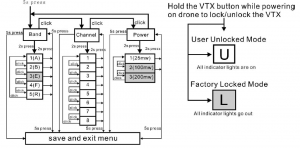
Factory Locked Configuration (≤ 25mW Output)

FCC: Ham radio license required for use in North America. EU/CE: Frequencies limited to prevent transmitting outside of designated CE frequencies.
User Unlocked Configuration (Adjustable Output)

FCC: Ham radio license required for use in North America. E band Channels 4, 7, and 8 limited to prevent transmitting outside of designated amateur radio frequencies.
Adjustable video output power only available on select models. EU/CE: Do not use Use Unlocked Configuration.
* By purchasing this product, the user is agreeing that he/she understands these responsibilities and will operate the equipment legally. EMAX cannot be heldresponsible for a user’s actions purchasing and/or using this product in violation of the governmental regulations.
Tinyhawk II Freestyle All-in-One Flight Controller
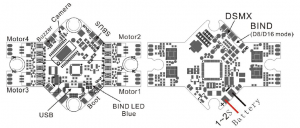
Tinyhawk II Freestyle’s main electronic board is shown above. This board contains a F4 flight controller with all 4 esc’s and an 8CH receiver.
Emax On-Board Receiver
The receiver is integrated into the main flight controller board and is set up via betaflight.
Number of Channels: 8CH
Compatibility: Receiver mode is SPI RX default protocol is FrSky_D (D8).
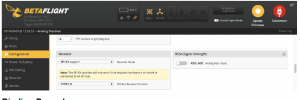
Binding Procedure
Binding is the process of uniquely associating a receiver to a transmitter module. A transmitter module can be bound to multiple receivers (not to be used simultaneously). A receiver can only be bound to one transmitter module.
- Hold the bind button for 2 seconds while the flight controller is already on. When the RED LED is flashing, it means the receiver is in BIND MODE
- Turn on the transmitter, make sure it is set to D8 mode, and then set it into bind mode. When the BLUE LED on the flight controller starts flashing, it means bind successful.
- Power cycle the flight controller and take your radio out of bind mode.
Alternate Binding Method
It is possible to place the receiver into Bind Mode via the Betaflight configurator. In the CLI tab type in this command: bind_rx_spi Hit enter and your receiver should be in bind mode. Follow steps 2-3 from above to complete the binding process.
Emax Tinyhawk II Freestyle Flight Controller (FC)
This flight controller has a F4 MCU with a MPU6000 gyro. Tinyhawk II Freestyle flight controller comes pre-programmed and properly tuned for optimal flight. For a full tune
and configuration setting file (CLI dump file) please visit https://emax-usa.com/ for the CLI dump file.
Stock Flight Controller Settings
Tinyhawk II Freestyle is configured to take a channel map of the TAER1234 convention. That is the channel map is in the respective order: throttle, aileron, elevator, rudder, AUX 1, AUX 2, AUX 3, and AUX 4. The arm switch on Tinyhawk II Freestyle is set on AUX 1 and armed with the highest value. AUX 2 is configured for a 3 stage switch to select flight modes: Acro, Horizon, and Angle activating in an increasing order. AUX 3 is configured for the beeper. In a high state the motors will beep. AUX 4 is set to Flip Over After Crash mode (often referred to as turtle mode).
Turtle mode is set when AUX 4 is in a high state. Please configure your radio as described above or change these settings in Betaflight Configurator.
PID profiles:
PID profile 1 is tuned and optimized for Tinyhawk II Freestyle with the provided 2x Emax 1s HV 450 mAh battery for ultimate control in outdoor flight. Please do not change these values.
Rate Profiles:
Profile 1 is designed for optimal outdoor flight for people who like to fly “thumber” style.
Profile 2 is a more sensitive rate profile tuned for people who like to fly “pincher”
style. These profiles can easily be switched in Betaflight OSD menu.
Adjusting Software Settings (Betaflight Configurator)
Betaflight Configurator can be used to changed programmed settings on Tinyhawk II Freestyle. Betaflight Configurator and flight controller firmware can be downloaded at
https://github.com/betaflight/. The hardware target for Tinyhawk II Freestyle Flight Controller is MatekF411RX.
DISCLAIMER: We do not suggest changing any PID settings on Tinyhawk II Freestyle or upgrading the firmware to new versions. Tinyhawk II Freestyle comes
stock with an optimal tune for superior flight performance. Changing this can affect flight time, overall speed, control of the aircraft, and excessive heat within the motors.
Reprogramming Tinyhawk II Freestyle Flight Controller
- Put the Flight Controller in DFU mode by pressing the BOOT button while plugging in the micro USB cable to a computer.
- Select MATEKF411RX as the target and then select the firmware or Select Manual Baud Rate with 256000 in the drop down menu
- Select Load Firmware(Online) to download the firmware or Load Firmware (Local) if already downloaded the hex file.
- Select Flash Firmware to program the flight controller
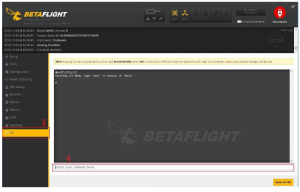
Restoring the Tinyhawk II Freestyle default settings
- Download the latest CLI Dump File from https://emax-usa.com/service
- Connect Tinyhawk II Freestyle to Betaflight configurator and select the CLI tab
- Open the CLI Dump File in a text editor and copy all the text.
- Paste the settings into the command bar and press enter
- Tinyhawk II Freestyle will reconnect to Betaflight when completed
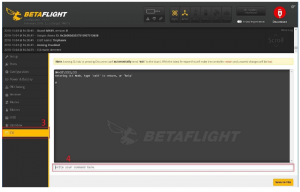
Flight
Always use caution when flying and operate in an open and controllable area. Please learn the flight controls first before powering on the aircraft to fly.
Radio Stick Controls
The left stick controls throttle and yaw direction of Tinyhawk II Freestyle. The right stick controls pitch and roll of the aircraft.
Left Stick Diagram
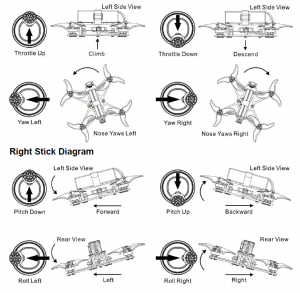
Fly Tinyhawk II Freestyle
Start by powering on your Radio and Goggles. Tinyhawk II Freestyle comes already bound to your radio and on the right video channel matched with your goggles.
Power on Tinyhawk II Freestyle by sliding the battery into the battery tray andplugging it in. Once the battery is plugged in, set Tinyhawk II Freestyle on a stable
surface so it can calibrate. Calibration takes a few seconds then Tinyhawk II Freestyle is ready to fly. Tinyhawk II Freestyle can fly for 4 minutes on a fully charged
battery. Land Tinyhawk II Freestyle when the battery reaches 3.2v; flying any longer can severely damage your battery and is not recommended.

Arming refers to setting Tinyhawk II Freestyle to a fly ready state. When Tinyhawk II Freestyle is powered on first it will not spin up the propellers until it is armed. Arm the
aircraft by first moving throttle to the bottom position. Then move the left switch of the radio to its 3rd position upwards. You will see the propellers spinning when TinyhawkII Freestyle is successfully armed.
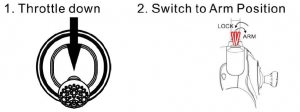
In the event of a crash always disarm immediately. Failure to disarm in a timely manner can damage Tinyhawk II Freestyle. Always disarm Tinyhawk II Freestyle before handling it.
Flying Modes
Tinyhawk II Freestyle comes stock set in rate mode. This is an advance mode where control sets the angular rate of the aircraft. The AUX 2 switch is set to change this mode on a 3 stage switch. When AUX 2 is in a high state, Tinyhawk II Freestyle will be in easy mode where control sets the attitude of the aircraft. When the switch is in the middle state, Tinyhawk II Freestyle will be in intermediate mode.
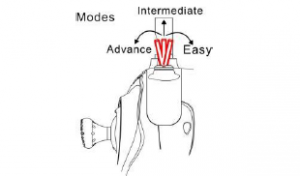
Easy Mode: This is easy flight control where the maximum angle of tinyhawk II Freestyle is limited in flight to help limit speed and make flying easier. In this mode control of the aircraft is attitude based. Input from the right gimbal with pitch and roll controls the pitch and roll angle of the aircraft. For example 20 degrees of tilt on roll of the gimbal will translate to 20 degrees of roll tilt on tinyhawk II Freestyle.
Intermediate Mode: This mode has a higher angle limit for higher speed flying with the same attitude control. The only difference is at the end of the gimbal for pitch and roll, it will cause the aircraft to flip in that direction.
Advance Mode: This mode gives you full control of the aircraft. There is no more angle limit and control is rate based. This means control input from the gimbal sets a
rotation rate on said axis.
Line of Sight Flying
To learn how to fly Tinyhawk II Freestyle start by flying it line of sight (no goggles yet). Power on Tinyhawk II Freestyle and set it down in a cleared room. Arm Tinyhawk IIFreestyle then throttle up using the left stick to a hover position. Work on maintaining a constant altitude. Pitch and roll Tinyhawk II Freestyle with the right thumb stick and yaw Tinyhawk II Freestyle with the left thumb stick.
First Person View (FPV) Flying
Make sure Tinyhawk II Freestyle and the goggles are on the same vtx channel and that you have a clear area to fly around in. Apply the same principals learned when flying Tinyhawk II Freestyle line of sight except now work on flying in a forward direction while maintaining a controlled constant altitude. It is easier to learn flying FPV by always moving in a forward direction so always apply a slight amount of pitch using your right thumb stick. You can steer Tinyhawk II Freestyle like a car using yaw on the left thumb stick.
There is an on screen display (OSD) overlaying the video feed from the camera of Tinyhawk II Freestyle. The OSD displays important information such as flight time
and battery voltage. Pay attention to these numbers during flight to know how much battery life is left. Tinyhawk II Freestyle can fly for a maximum of 4 minutes. When the battery reaches 3.2v, land Tinyhawk II Freestyle. Drawing the battery below 3.2v is not suggested and can damage the battery.
Tips: Work on maintaining a controlled altitude flight to begin while driving Tinyhawk II Freestyle with pitch and yaw. Do not let the battery go lower than 3.2v. The arm
switch activates a beeper when set in the 2nd position (middle); this is useful whenlooking for Tinyhawk II Freestyle.
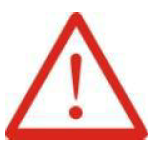
Please pay attention to your surroundings.
Not recommended for persons under 18 years of age.